Philosophy, Politics and Economics with a Year in Industry
UCAS code L0V1
- Study mode
- Full-time
- Duration
- 4 years
- Start date and application deadlines
-
- Start date
UCAS code L0V1
This programme offers the same content as our three-year BA in Philosophy, Politics and Economics, but with the addition of a year in industry after the second year.
A degree in Philosophy, Politics and Economics unites three disciplines that are foundational to public life and policy. Nowadays, anyone hoping to understand or advance in politics has to be proficient in economics, and an understanding of the philosophical underpinnings of the various political views that jostle on the public stage has long been recognised as hugely important.
As with the three-year degree, this programme provides the opportunity to master the overlap of the three disciplines, to come to grips with some of their specialisms, to attain a very thorough grounding in mathematical economics, and to develop skills in identifying and evaluating the principles and values that underlie debates. The combination is highly sought after by employers, who appreciate the breadth of knowledge and variety of skills that it provides.
Year one will comprise entirely of compulsory modules: four from Economics, and two each from Philosophy and Politics. In year two, as well as a range of Philosophy and Politics options, you will take some compulsory modules which include SOTA260, which will prepare you for your year in industry.
Your third year will be spent on a salaried placement in a role related to your studies, giving you the opportunity to apply skills and knowledge acquired during study to a real-life situation, thus developing key life and employability skills.
In your final year you will undertake a PPE-focused dissertation, and then optional modules from each of the three subjects.
Year in Industry
This programme is available with an optional year in industry. If you choose this option, year three is spent on a paid placement within an organisation in industry, broadly defined. You will be supported by the School of the Arts and the Department throughout, and your reflexive written account of the experience will contribute towards your final degree result. If you wish to study this programme with a year in industry, please put the option code ‘YI’ in the ‘further choices’ section of your UCAS application form.

We’re proud to announce we’ve been awarded a Gold rating for educational excellence.
Discover what you'll learn, what you'll study, and how you'll be taught and assessed.
You will take compulsory modules in each of the three subjects, which will give you the mathematical, philosophical, and political foundations for the rest of you degree.
Programme details and modules listed are illustrative only and subject to change.
You will take compulsory modules in Economics, a module in Business Ethics (PHIL272), and SOTA260 in preparation for your year in industry. The remaining 30 credits will be taken from a range of options in Politics.
| Compulsory modules | Credits |
|---|---|
| BUSINESS ETHICS (PHIL272) | 15 |
| MACROECONOMICS 1 (ECON223) | 15 |
| MACROECONOMICS 2 (ECON224) | 15 |
| MICROECONOMICS 1 (ECON221) | 15 |
| MICROECONOMICS 2 (ECON222) | 15 |
| PROFESSIONAL AND CAREER DEVELOPMENT (SOTA260) | 15 |
Programme details and modules listed are illustrative only and subject to change.
You will spend your third year on a paid placement within an organisation in a related industry. Support for your placement will be provided by the Department and the School of the Arts.
| Compulsory modules | Credits |
|---|---|
| WORK PLACEMENT YEAR (SOTA600) | 120 |
Programme details and modules listed are illustrative only and subject to change.
In your final year, you must complete a dissertation (HASS301). The rest of your modules are chosen from a range of options.
In semester one, you will be required to:
In semester two, you will be required to:
| Compulsory modules | Credits |
|---|---|
| PHILOSOPHY, POLITICS AND ECONOMICS DISSERTATION (HASS301) | 30 |
Programme details and modules listed are illustrative only and subject to change.
In studying Philosophy, you will learn how to defend your views with reasoned arguments, and to assess the arguments of others. Argumentative skills are learned through attending lectures and reading philosophical texts, developed by group seminar discussions, and formally assessed through essays and exams. You will complete modules to the value of 120 credits per year, from a wide range of options available. Most modules employ a blend of lectures, seminars, and online support materials. You will learn by reading and studying outside class time, by attending and participating in classes, by doing coursework and, for dissertations, via one-to-one meetings with a supervisor. There is also scope, both formally in the placement module and informally, for you to develop practical skills by volunteering.
Philosophy employs a mixture of modes of assessment: exams and coursework in many different varieties including essays, oral presentations, dissertations, exercises, and supported independent work (eg in the placement module).
We have a distinctive approach to education, the Liverpool Curriculum Framework, which focuses on research-connected teaching, active learning, and authentic assessment to ensure our students graduate as digitally fluent and confident global citizens.
The Liverpool Curriculum framework sets out our distinctive approach to education. Our teaching staff support our students to develop academic knowledge, skills, and understanding alongside our graduate attributes:
Our curriculum is characterised by the three Liverpool Hallmarks:
All this is underpinned by our core value of inclusivity and commitment to providing a curriculum that is accessible to all students.
The qualifications and exam results you'll need to apply for this course.
| Qualification | Details |
|---|---|
| A levels |
BBB (including Mathematics: B) |
| GCSE |
GCSE Mathematics at grade 5/C and GCSE English at grade 4/C required. |
| BTEC Level 3 national extended diploma |
DDD and grade B in A level Mathematics. GCSE Mathematics grade 5 required. |
| BTEC combinations |
BTEC National Diploma D*D plus grade B at Mathematics A level; BTEC National Extended Certificate D plus grade B in Mathematics at A level and grade D in another A level. GCSE Mathematics grade 5 required. |
| Welsh Baccalaureate Advanced |
B in the Welsh Baccalaureate, plus AB at A level, including grade B in Mathematics. GCSE Mathematics grade 5 required. |
| Access |
May be considered; please submit an application. Must include a minimum of 15 level 3 graded credits in Mathematics at Distinction. |
Studying with us means you can tailor your degree to suit you. Here's what is available on this course.
This course is also available without an included year in industry.
View Philosophy, Politics and Economics BA (Hons)
To spend a year in industry, you'll need to secure a placement with an organisation. If you're unable to find a placement, you'll continue with the standard version of the course without a year in industry.
Every student at The University of Liverpool can study a language as part of, or alongside their degree. You can choose:
The Department of Philosophy is based in the School of the Arts, although teaching will take place across the campus, including the Department of Politics and University of Liverpool Management School. Our staff and students have created an environment where critical, independent thinking flourishes, in a city that has a long tradition of welcoming radical thinkers and philosophers. Our friendly, down-to-earth atmosphere makes the exchange of ideas enjoyable, as well as intellectually stimulating.
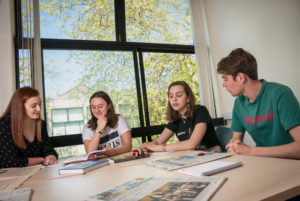
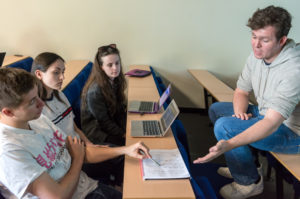
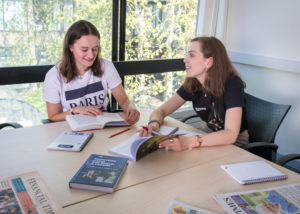


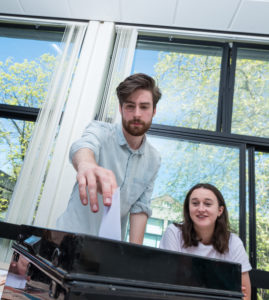
From arrival to alumni, we’re with you all the way:
The interdisciplinary nature appealed to me. It provided me with a wide range of angles to approach both my modules and the wider world. I really enjoyed the Political Philosophy and International Political Economy modules.

Want to find out more about student life?
Chat with our student ambassadors and ask any questions you have.
Graduating with a degree in philosophy will empower you to delve into the profound questions that shape human existence but also position you as a valuable asset in today’s competitive job market.
The School has its own placements and employability officer, and you will have the opportunity to undertake a work placement or a year in industry as part of your programme.
Graduates in Philosophy obtain work in fields such as:
3 in 4 philosophy students find their main activity after graduation meaningful.
(Graduate Outcomes, 2018-19.)
Hear what graduates say about their career progression and life after university.
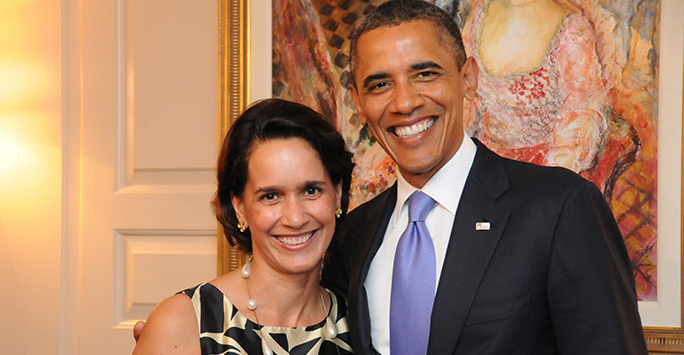
US District Judge Wendy Beetlestone described her time at University of Liverpool as a “great start” that delivered the “thought discipline” that continues to influence her professional life.

Emma is a Production Management Assistant on the One Show.
Your tuition fees, funding your studies, and other costs to consider.
Full-time place, per year - £9,535
Year in industry fee - £1,905
Full-time place, per year - £24,100
Year in industry fee - £1,905
The tuition fees shown are correct for 2025/26 entry. Please note that the year abroad fee also applies to the year in China.
Tuition fees cover the cost of your teaching and assessment, operating facilities such as libraries, IT equipment, and access to academic and personal support. Learn more about paying for your studies.
We understand that budgeting for your time at university is important, and we want to make sure you understand any course-related costs that are not covered by your tuition fee. This could include buying a laptop, books, or stationery.
Find out more about the additional study costs that may apply to this course.
We offer a range of scholarships and bursaries that could help pay your tuition and living expenses.
If you’re a UK student joining an undergraduate degree and have a household income below £35,000, you could be eligible for a Liverpool Bursary worth up to £2,000 for each year of undergraduate study.
Apply for an Asylum Seekers Scholarship and you could have your tuition fees paid in full and receive help with study costs. You’ll need to have applied for asylum in the UK, or be the dependant of an asylum seeker, and be joining an eligible undergraduate degree.
If you’ve spent 13 or more weeks in Local Authority care since age 14, you could be eligible for a bursary of £3,000 per year of study. You’ll need to be a UK student joining an eligible undergraduate degree and be aged 28 or above on 1 September in the year you start.
Are you a UK student with a Black African or Caribbean heritage and a household income of £25,000 or less? You could be eligible to apply for a Cowrie Foundation Scholarship worth up to £8,000 for each year of undergraduate study.
If you’re a UK student identified as estranged by Student Finance England (or the equivalent UK funding body), you could be eligible for a bursary of £1,000 for each year of undergraduate study.
Do you live in the Liverpool City Region with a household income of £25,000 or less? Did neither of your parents attend University? You could be eligible to apply for a Nolan Scholarship worth £5,000 per year for three years of undergraduate study.
Are you a UK student with a household income of £25,000 or less? If you’ve participated in an eligible outreach programme, you could be eligible to apply for a Rigby Enterprise Award worth £5,000 per year for three years of your undergraduate degree.
Are you a UK student with a household income of £25,000 or less? Did neither of your parents attend University? You could be eligible to apply for a ROLABOTIC Scholarship worth £4,500 for each year of your undergraduate degree.
Apply to receive tailored training support to enhance your sporting performance. Our athlete support package includes a range of benefits, from bespoke strength and conditioning training to physiotherapy sessions and one-to-one nutritional advice.
If you’re a young adult and a registered carer in the UK, you might be eligible for a £1,000 bursary for each year of study. You’ll need to be aged 18-25 on 1 September in the year you start your undergraduate degree.
Use our handy chatbot for your Clearing enquiries.
Last updated 1 July 2025 / / Programme terms and conditions